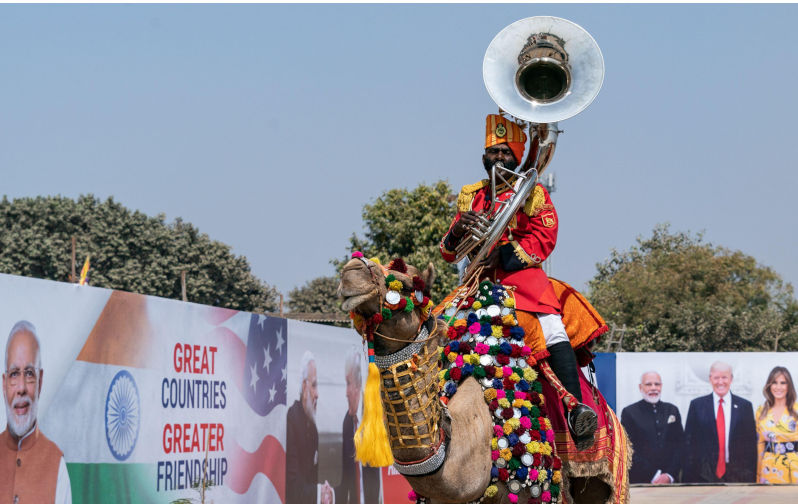Honeymoon over: Trump divorces India
August 27, 2025
In 2019, Donald Trump and Narendra Modi paraded their bromance with a 50,000-person “Howdy Modi” rally in Houston.
They followed that up with a “Namaste Trump” 100,000-person event in India. As recently as February, Trump lavished praise on Modi, saying the two countries had “a mega partnership for prosperity.”
Trump was the darling of the Indian diaspora in the US. He seemed quite willing to ignore Modi’s record as an aggressive Hindu nationalist who has sparked violence against the Muslim minority. The two men share an admiration for strongman rule and an obliviousness to human rights.
That was then; this is now. Trump has replaced the enduring friendship with a 25% tariff on Indian goods, and an additional 25% penalty tariff to protest India’s purchases of Russian oil. The US trade deficit with India was also mentioned as grounds for divorce.
But the real reason might be, according to Bloomberg, that Trump is miffed that India did not give him credit, which he claimed, for helping India and Pakistan reach a ceasefire in their May war. “Although the US never made a direct request for Modi to acknowledge Trump’s role in the ceasefire,” Bloomberg reports, “India saw a shift in tone from the White House after that phone call, according to the officials in New Delhi.” The report is easy to believe, considering how much Trump covets a Nobel Peace Prize for his work as a “peace president".
Now that India is out of favour, Trump has declared its economy (along with Russia’s) “dead.” This is the same India whose high-tech economy is considered one of the world’s brightest stars. But with Trump, everything is personal: he’s upset with Apple, Eli Lilly, Blackstone, and other US multinationals for setting up shop in India rather than investing more in the US. Trump’s tariffs leave them high and dry. Trump has announced that Apple will invest US$100 billion in US-based manufacturing, but Apple has made grandiose pledges before.
Strategic errors
Failure to think strategically can be costly. India had long been viewed by the US, even in Trump’s first term, as a counterweight to China. Recent India-China border talks suggest a lowering of tensions and an emphasis on diplomacy, following a history of conflict over the last 60 or so years.
The US-India falling out will help Beijing and New Delhi find new sources of partnership. Modi has already been in touch with Beijing, whose ambassador to India is gloating over Trump’s bullying on social media. Modi will shortly be visiting China for the first time in seven years.
Trump’s team may want to consider whether a trade penalty was worth the cost of driving Modi into Putin’s arms as well. Kurt Campbell, Biden’s deputy secretary of state, had it right when he said: “If you tell India that it has to sacrifice its relationship with Russia, then Indian strategists are going to do the exact opposite.”
So they did. After Trump’s tariff announcement, Modi’s foreign minister visited Moscow and Modi was on the phone with Vladimir Putin. Modi spoke glowingly of the conversation: “Had a very good and detailed conversation with my friend President Putin. I thanked him for sharing the latest developments on Ukraine. We . . . reaffirmed our commitment to further deepen the India-Russia Special and Privileged Strategic Partnership.”
India’s exports to Russia will now expand, and India will dispatch workers to Russia with skills in IT, construction and engineering to help address labour shortages. India’s imports of Russian oil will continue, unaffected by Trump’s threats.
Another Trump strategic error is simultaneously alienating not one but two leading voices in the Global South –India and Brazil, both of which are founding members of the BRICS group (Brazil-Russia-India-China-South Africa). Every one of those five countries is now at odds with Trump, who has threatened all of them with high tariffs if they adopt their own currency for trade transactions instead of the dollar.
Modi will, no doubt, tell his BRICS colleagues that India’s economy simply cannot take the hit that Trump’s tariffs will create. You can expect that China and Russia will be first to step up and help.
Fighting back
India does have other ways to fight back against Trump. Its foreign ministry has said the US decision was “extremely unfortunate”, and that “India will take all necessary steps to protect its national interests”. The Indian press has been less diplomatic. One well-known journalist, Barkha Dutt, said in a CNN interview by Fareed Zakaria that no-one in India believes Trump’s stated reasons for the tariff increases.
She called Trump “infantile,” “inane,” a “bully”. A boycott of US goods is underway, and India has petitioned the WTO to act against Trump’s tariffs. Modi may also take a cue from President Lula in Brazil by promising US$5.5 billion in credits to exporters and postponement of their taxes in response to Trump’s tariffs.
In any other administration, nothing India has done or said would undermine close ties. But this is the Trump era, in which personal pique and trade have replaced strategic thinking and policy based on the national interest.
Trump is playing a loser’s game.
Republished from CounterPunch, August 25 2025
The views expressed in this article may or may not reflect those of Pearls and Irritations.

